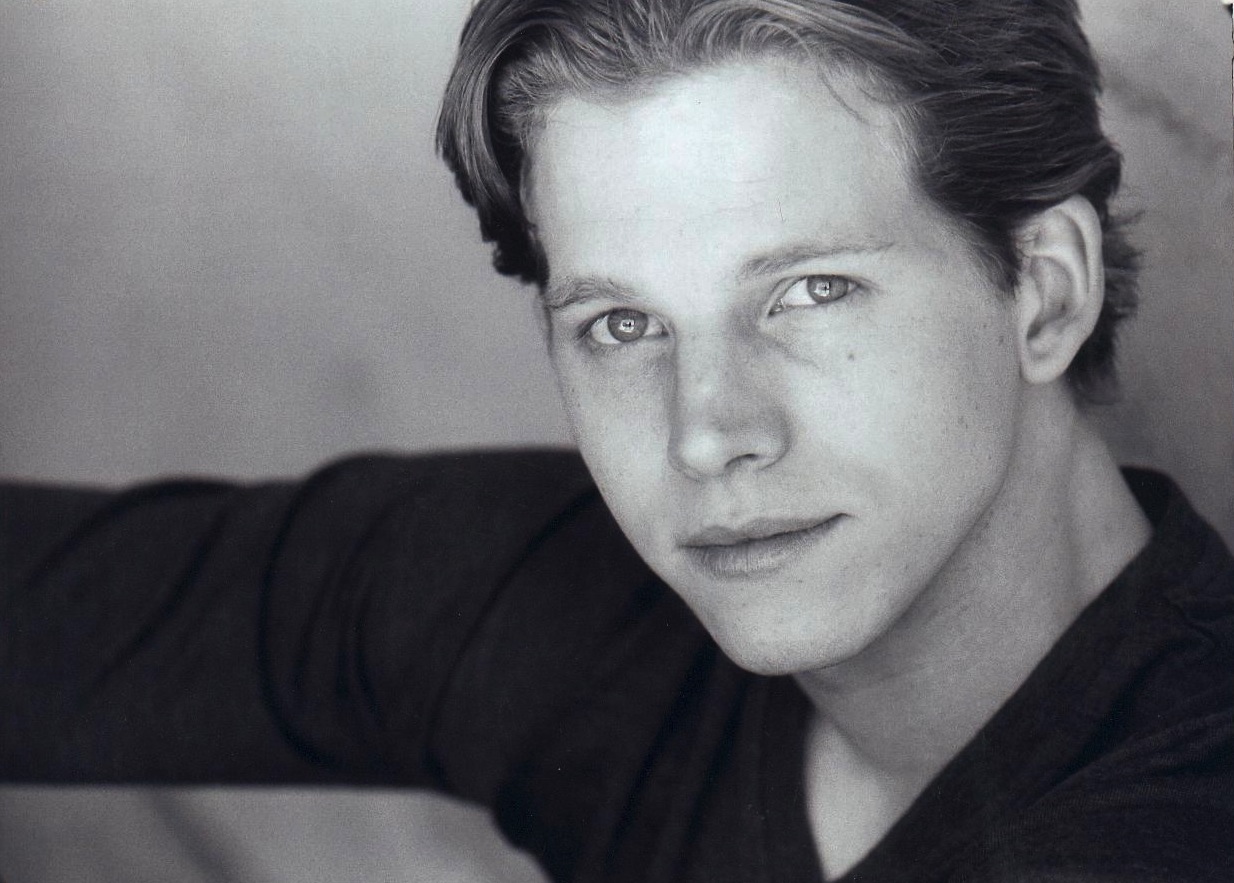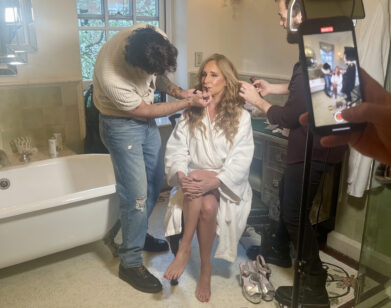Stark Sands Cops to It

CBS’s latest foray into the crime-procedural genre, NYC 22, features a cast and creative team with extensive experience portraying dangerous streets. Writer Richard Price (The Wire, Clockers) created the series, and Robert De Niro is an executive producer. Stark Sands, who plays one of the central rookie cops, has also built a near-monopoly on the serviceman role, having played soldiers in Flags of Our Fathers, HBO’s Generation Kill, Broadway’s American Idiot, and in a zombie-apocalypse film. He’ll also portray a vet-turned-musician in the 2013-slated Coen Brothers film Inside Llewyn Davis, singing alongside Justin Timberlake.
Interview spoke with Sands about shooting guns, walking around Harlem dressed like a cop, and wearing wigs to look more like Anne Hathaway.
JENNY AN: You’re one of the leads in NYC 22; how has that been so far?
STARK SANDS: When you fall into a midseason slot, you have the sort of blessing of not being on television while you shoot most of your season. We started shooting in the fall, and we shot all 13 episodes without any audience feedback. What ended happening was that the network has to go off its own instincts, so the show becomes what the network wants it to be. It’s still a great show, but most of it is very different from the pilot. And as the season goes on, you’ll see that it finds its niche four or five episodes in.
AN: Richard Price is probably best known on television for writing a few episodes of The Wire. How’s this a different police procedural from that one?
SANDS: He’s so good at understanding how minds think in the world of crime and justice. In the beginning of the season, the show is this gritty police procedural. It’s very character-driven. Over the course of the season though, it changes into a very standalone episode, action-packed, explosive, more action-driven thing. Richard was around for a lot of the first half and then he sort of disappeared into the writers’ room. But he’s brilliant, and I’m really lucky for him to write things for me to say and do.
AN: So you were shooting on the streets of New York. Did anything unpredicted happen while you were on set?
SANDS: [laughs] Yes. Yes. That was one big difference. All my television work before this had never been in a big, big city and on a real city street where there are actual civilians walking around and in the backgrounds of the shots.
So we’re shooting in Harlem, and there was a motorcycle gang. They’re not what you’d expect. They weren’t a Hells Angels kind of gang. They just had these Japanese bikes which were really loud and would do wheelies in the back of the shots. They would find us. We worked within the same parameters and neighborhood everyday and whenever they found us in the afternoon, they’d just go around the block en masse. I guess the idea was that they’d be in it. [laughs]
Every director we had was like “Look at this gang, we have to use them!” So I’m really interested in seeing how that plays out. If they have a regular role in the show.
AN: So how similar was your experience of living in New York to the one presented in the show?
SANDS: [laughs] Well, it’s different. I moved to New York to work in theater, so my range of motion was really from where I lived—which was downtown, in the Lower East Side—to Midtown, where the theaters are. So I got to know New York, Midtown and south.
Harlem is a very different place. We’re very convincing in our uniforms. I look like a real cop. You really have to have an eye to know that the badge on my shoulder is not in fact NYPD. When we shot the pilot, I decided to explore the neighborhood, because I thought, “This is where we’ll be. I want to know what it’s like to be around here,” but I wasn’t thinking that I looked like I was in an NYPD uniform. So I got different attention than what I would normally get while just walking down the street in my normal clothes. I had people thinking that I was really a cop. I had people who asked me for directions. I had people give me dirty looks. I had things thrown at me from the top of buildings. It was a really interesting thing that I hadn’t thought about. It was a good way to put myself in my character’s shoes, but maybe not the smartest thing to do.
AN: So how long was this whole walk-about?
SANDS: By the time I was halfway around the block, I realized that there were guys looking at me funny. But I couldn’t turn around because we caught eyes. I couldn’t show any fear. I just had to continue my walk around the block. The whole thing probably only lasted five or 10 minutes.
AN: You just finished working on the new Coen Brothers movie Inside Llewyn Davis. How was that experience?
SANDS: That was really cool. [laughs] I auditioned for that job in September, and three months later, I got the job. Those guys are so great and incredible to work with. They take the time, and I never wanted to rush them. I went in there and auditioned and I gave a good audition. I knew from my agents that I was “in the mix,” and I got that for three months.
The whole experience was a trip. I got hired to be a soldier, again—which is what I’m getting good at [laughs]—but I’ll take it because it got me that job.
I play a soldier who’s in the middle of this folk-revival scene in Greenwich Village. I sing in the movie. I play guitar. I had to learn a new skill. I’ve been a guitar player for 10 years, but I’m self-taught and a strummer. They needed me to learn how to finger-pick. I had this real sense of satisfaction when I showed up to my first scene and was really good. I didn’t even have to think about it much. My fingers knew what they were doing.
AN: And which songs did you play?
SANDS: I do two songs. I sing one by myself called “The Last Thing on My Mind,” originally by Tom Paxton. Then I sing another song. This is the other crazy thing. Later in the scene I invite “my friends” up, this couple who are also folk singers. And the couple who I invite to sing with me are played by Justin Timberlake and Carey Mulligan. I never thought I’d be singing, on a soundtrack, on a film, with someone like Justin.
AN: You’ve been frequently cast frequently as men in uniform. What do you think about your physical appearance or the way you perform makes you an excellent, serving-your-country type?
SANDS: Honestly, I think it’s because every time I get a job playing a soldier, I have to get my hair cut really short. And it takes a while for my hair to grow out and so when I’m auditioning for stuff, I look like a soldier still, because my hair’s a buzz cut.
AN: So what is your natural coif like?
SANDS: Thick, blond. In high school, after I hit puberty, it went from golden-blond curls to a thick, wavy Kramer-from-Seinfeld kind of look that I could not control. In college, I had it chemically straightened—relaxed, I guess—because I really wanted something different. [laughs] Now, I really don’t know. I’ll have to find out. Maybe if I don’t work for a while, I can grow it out and see.
I’ve worn wigs. I’ve done a few plays where I have to wear a wig because they needed longer hair. I had to be Annie Hathaway’s twin in Shakespeare in the Park, Twelfth Night, a couple years ago and we played twins that were separated at sea. So they needed me to look like her. I wore brown contacts and dark-brown, long, straight hair—very dashing and princely. It was fun that every night, I got to put on a disguise.
AN: Are you a good shot?
SANDS: [laughs] Yeah. When I got the job for Generation Kill, I was still doing a play on Broadway and wasn’t able to make the boot camp that all the actors were going to. So when I came out to Africa, I had one day of boot camp instead of two weeks like the rest of the guys.
But I grew up in Texas in a family that fished and hunted, so I’ve shot guns as a kid. When I showed up to boot camp, the Marine showing me the weapons, he didn’t ask. He just assumed I didn’t know how to shoot. When it was my turn with the M-16 and I was really good, they were all really impressed. They thought I was a natural.
That’s been my go-to behavior with these things. With 22, when we were at the shooting range with our cop advisor and they were showing us how to use these weapons, I was really good right off the bat. I just kept my mouth shut. I just let them believe that I was naturally good and that it was not because I have a lot of practice.
NYC 22 PREMIERES THIS SUNDAY, APR. 15, AT 10 PM ON CBS.






